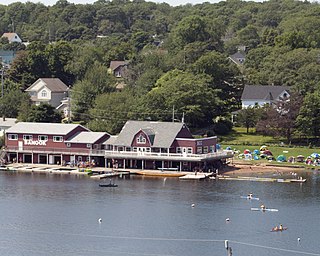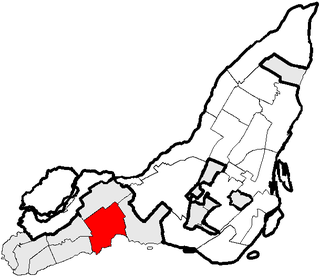Related Research Articles

Canoe sprint is a water sport in which athletes race canoes or kayaks on calm water.

Lake Banook is a freshwater lake located in Dartmouth within the Halifax Regional Municipality in Nova Scotia, Canada. It is home to three sprint canoe and kayak clubs, two rowing clubs, and a dragon boat club. It also has a claim to be the birthplace of ice hockey.
The Royal Canoe Club (RCC), founded in 1866, is the oldest canoe club in the world and received royal patronage in the 19th century. The club promotes canoeing and kayaking, focusing on flatwater, sprint and marathon disciplines. Members of the club have represented Great Britain at World Championships and the Olympic Games. The club is based at Trowlock Island on the River Thames in Teddington near London. The premises are also used by Walbrook Rowing Club, The Skiff Club and Kingston Royals Dragon Boat Racing Club.

Francis Amyot was a Canadian sprint canoeist who competed in the 1930s. He won Canada's only gold medal at the 1936 Summer Olympics.

The Rideau Canoe Club (RCC) is a canoe club located on the Rideau River in Ottawa, Ontario, Canada. The club is located at Mooney's Bay, where the Rideau Canal splits away from the river prior to joining up with the Ottawa River.

A sprint canoe is a canoe used in International Canoe Federation canoe sprint. It is an open boat propelled by one, two or four paddlers from a kneeling position, using single-bladed paddles. The difficulty of balance can depend on how wide or narrow the canoe is, although regularly the less contact a canoe has with the water the faster it goes. This makes the narrower boats much faster and popular when it comes to racing.
The Canadian International Dragon Boat Festival or Concord Pacific Dragon Boat Festival takes place every June on the waters and shoreside of False Creek in Vancouver, British Columbia, Canada. It is North America's largest and most competitive dragon boat festival with over 200 crews competing from around the world, with roots stemming from Expo 86. The Concord Pacific Dragon Boat Festival is run by the Canadian International Dragon Boat Festival Society.
The Burloak Canoe Club is a flatwater canoe/kayak racing club located in Oakville, Ontario. It serves the communities of Burlington and Oakville and provides a variety of canoe-based activities for local residents focusing primarily on the two disciplines of sprint canoe and sprint kayak. Burloak Canoe Club is located on Navy Flats along the banks of Sixteen Mile Creek and boasts a sizable building that caters not only to sport but to special events as well.
Mic Mac Amateur Aquatic Club (MMAAC) is located on Lake Banook in Dartmouth, Nova Scotia, Canada. This organization provides structured recreational and competitive paddling, rowing, dragon boat, and swimming programs to the local community ages 6+. Summer day camp programs are also offered for kids ages 6-12.

A war canoe is a watercraft of the canoe type designed and outfitted for warfare, and which is found in various forms in many world cultures. In modern times, such designs have become adapted as a sport, and "war canoe" can mean a type of flatwater racing canoe.

Halifax, Nova Scotia, with the largest urban population in Atlantic Canada, is a major sporting centre.

Canoe Kayak Canada is the governing body of competitive canoeing and kayaking disciplines in Canada. The three specific disciplines represented are flatwater, whitewater and marathon. Canoe Kayak Canada officially replaced the name "Canadian Canoe Association" in 2005, although the former title is still used by the organization. The name change came about from a desire to include the kayaking discipline in the organization's name.
Thomas Hall, is an Olympic sprint canoeist from Pointe Claire, Quebec, Canada. Training with the Pointe-Claire Canoe Club, he began his international career in 1999, winning a gold medal in the C-1 1000 m event at the Junior World Championships. By the time of the 2008 Summer Olympics, he had made a total of 44 top three finishes in international canoeing competitions, including 14 wins. Among these were a gold and a bronze medal at the 2003 Pan American Games. At the Beijing Olympic Games, he won a bronze medal in the Men's C-1 1000 metres event.

Canoeing – recreational boating activity or paddle sport in which you kneel or sit facing forward in an open or closed-decked canoe, and propel yourself with a single-bladed paddle, under your own power.

The Britannia Yacht Club (BYC) is a private social club, yacht club, and tennis club based in Britannia, a neighborhood in Ottawa, Ontario, Canada. It was founded in 1887 by a group of cottagers.

The Pointe-Claire Yacht Club is a yacht club in Pointe-Claire, Quebec, Canada. It is an important historical establishment that has been a part of the Pointe-Claire community for more than 130 years.
ICF Canoe Marathon World Championships is an International Canoe Federation competition in canoe marathon in which athletes compete over long distances. The race usually starts and ends at the same place, and includes portages. Race categories vary by the number of athletes in the boat, the length of the course, and whether the boat is a canoe or kayak. In a kayak, the paddler is seated in the direction of travel, and uses a double-bladed paddle. In a canoe the paddler kneels on one knee with the other leg forward and foot flat on the floor inside the boat, and paddles a single-bladed paddle on one side only. The World Championships were held every two years from 1988, becoming annual in 1998.

Paracanoe is canoeing for athletes with a range of physical disabilities. The Paralympic version of the sport is governed by the International Canoe Federation (ICF), and a va'a-specific variant is governed by the International Va'a Federation (IVF).
Ottawa River Canoe Club (ORCC) is a non-profit paddling organization in operation since 2002 and located in the west-end of Ottawa, Ontario, Canada. The organization offers a variety of recreational and competitive paddling programs for everyone, including:
References
- ↑ Greenaway, Kathryn. "Dragon boating for beginners at Pointe-Claire Canoe Club". Montreal Gazette. Retrieved 9 April 2016.
- ↑ Birch, Liam. "Pointe-Claire". Canada's Sprint Canoe Clubs. Retrieved 9 April 2016.
- ↑ "Gauthier captures two more medals". Canoe Kayak Canada. Retrieved 9 April 2016.